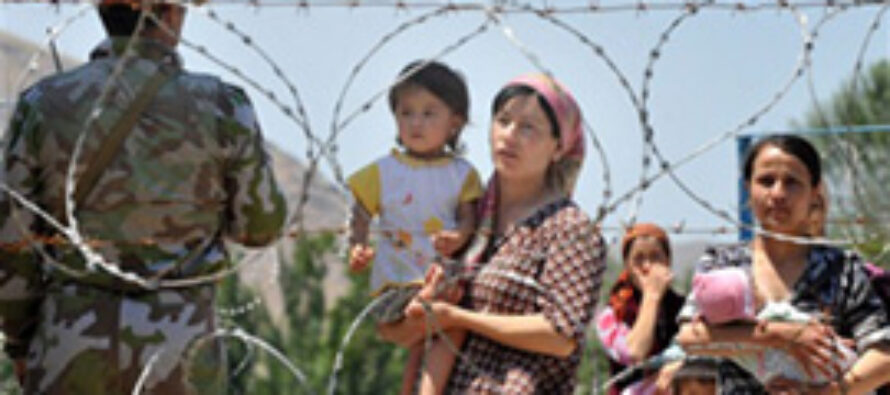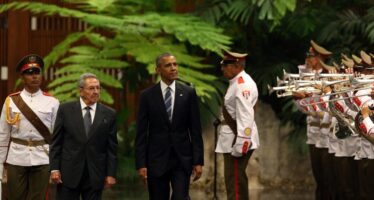A Central Asian tinderbox

![]()

A Central Asian tinderbox
By Roman Muzalevsky
Ethnic violence between Kyrgyz and ethnic Uzbeks in southern Kyrgyzstan has left hundreds dead, while thousands of people have fled the conflict zones to neighbouring Uzbekistan.
Both the UN and the interim government – which came to power in April after President Kurmanbek Bakiyev was ousted – have accused hired criminal gangs of assaulting Uzbeks and Kyrgyz with the aim of undermining the interim government ahead of a constitutional referendum scheduled for June 27.
Rapid and effective promulgation of evidence revealing the pre-planned nature of the attacks will provide the conditions in which some level of trust can begin to be built between the two ethnic groups.
Interested parties
Meanwhile, the US and Russia are closely watching the developments on the ground. Both have military bases in Kyrgyzstan, with the US transit centre at Manas being critical for the war effort in another unstable part of the region – Afghanistan.
But, despite the high level of instability in the region and the interim government’s alarming acknowledgement that it could not assert full control over the situation, neither the US nor Russia has considered a military intervention at this stage.
For Russia the deployment of troops might entail substantial financial and human resources. A possible negative reaction at home, as well as potential criticism from the West and other countries in the region, most likely feature prominently in the calculations of the Russian government – recall the conflicts in Chechnya and Georgia.
And the US already has too much on its plate in Afghanistan and elsewhere to be able to intervene militarily.
Kazakhstan and Uzbekistan, which gained their independence from Moscow relatively recently, are not keen to see a Russian military presence near their borders.
China, despite its expanding economic influence in Central Asia, has for now chosen to remain largely on the sidelines.
In other words, only multi-lateral intervention – if it takes place at all given the current normalisation of the situation in the south of Kyrgyzstan – appears to be an acceptable mechanism for all interested parties.
However, considering the multitude, potency and nature of transnational threats at this stage of globalisation, unilateral actions under appropriate circumstances should not be ruled out to prevent regional conflagration.
Underdeveloped and impoverished
Along with areas of Tajikistan and Uzbekistan the southern part of Kyrgyzstan forms a densely-populated and economically underdeveloped and impoverished Ferghana Valley, which is home to criminal groups, drug traffickers and terrorist movements.
The region has for many years been a tinderbox ready to explode and engulf the entire Central Asian region at any time.
Speculation is already circulating in the media that a third force is attempting to bring two regional neighbours – Uzbekistan and Kyrgyzstan – to the point of war.
Instability in neighbouring Afghanistan and generally difficult economic and social conditions in the Central Asian region reinforce the imperative of bringing the current situation in Kyrgyzstan under control as swiftly as possible.
This will help to prevent the violence from spilling across the national borders of largely weak states and deny criminal and terrorist networks a haven in which to breed on instability and promote their political alternatives.
Failing states
The clashes between various ethnic groups in the Fergana Valley – Kyrgyz, Uzbeks, Meskhetian Turks, Tajiks – in the last two decades have effectively demonstrated the struggles the regional states have encountered in nation-building following the collapse of the Soviet Union.
The ongoing instability in the south of Kyrgyzstan is but one tragic manifestation of this trend.
Failing states have clearly come to represent a source of growing transnational threats.
Not only do the countries in this region lack effective government institutions, but their governments also tend to be authoritarian, corrupt and neglectful of their already poor populations.
The southern part of Kyrgyzstan, which is to a large extent economically and culturally detached from the northern part of the country, is especially prone to instability and is in urgent need of socio-economic advancement. Only this will help to assert the legitimacy and integrity of the Kyrgyz state.
Inherently unstable
Numerous events in Kyrgyzstan – the Kyrgyz-Uzbek conflicts in 1990, the “Tulip Revolution” in 2005, the protests in 2010, and the recent ethnic clashes – all demonstrate that authoritarian states are fragile and inherently unstable, despite the fact that democratic aspirations clearly exist.
Corruption and the undemocratic nature of politics in Kyrgyzstan and other Central Asian states has consistently deprived the people of the region of normal living conditions and, in the case of Kyrgyzstan, put at risk the sovereignty of the state.
Kyrgyzstan now needs to pursue an accelerated economic integration of its regions and the consolidation of national identity.
It also needs to build effective and accountable public institutions, as well as to promote a democratic and inclusive political culture.
Only fighting poverty and authoritarianism in Kyrgyzstan and elsewhere in Central Asia will help to prevent the emergence of failed states and to ensure that a reliable security system exists in the region.
Roman Muzalevsky is an international affairs and security analyst on Central Asia and the Caucasus.
Related Articles
Sledgehammer CDs not fabricated, say ‘cosmic room’ civil servants
![]()
FAT?H U?UR / SAL?H SARIKAYA, ?STANBUL Photographs of the ‘cosmic room’ taken by civil servants in the 1st Army.
EEUU lanza estrategia militar para el Ártico
![]()
Un equipo de cinco soldados del primer pelotón de la 176 Compañía de Comunicaciones tira de un trineo AKIO cargado
¿Obama en el Gran Teatro o el gran teatro de Obama en La Habana? Por Iroel Sánchez
![]()
Cuba, América Latina y el mundo escucharon con gran expectativa a Barack Obama este 22 de marzo desde el Gran Teatro de La Habana, con un discurso conciliador, inteligente y seductor



